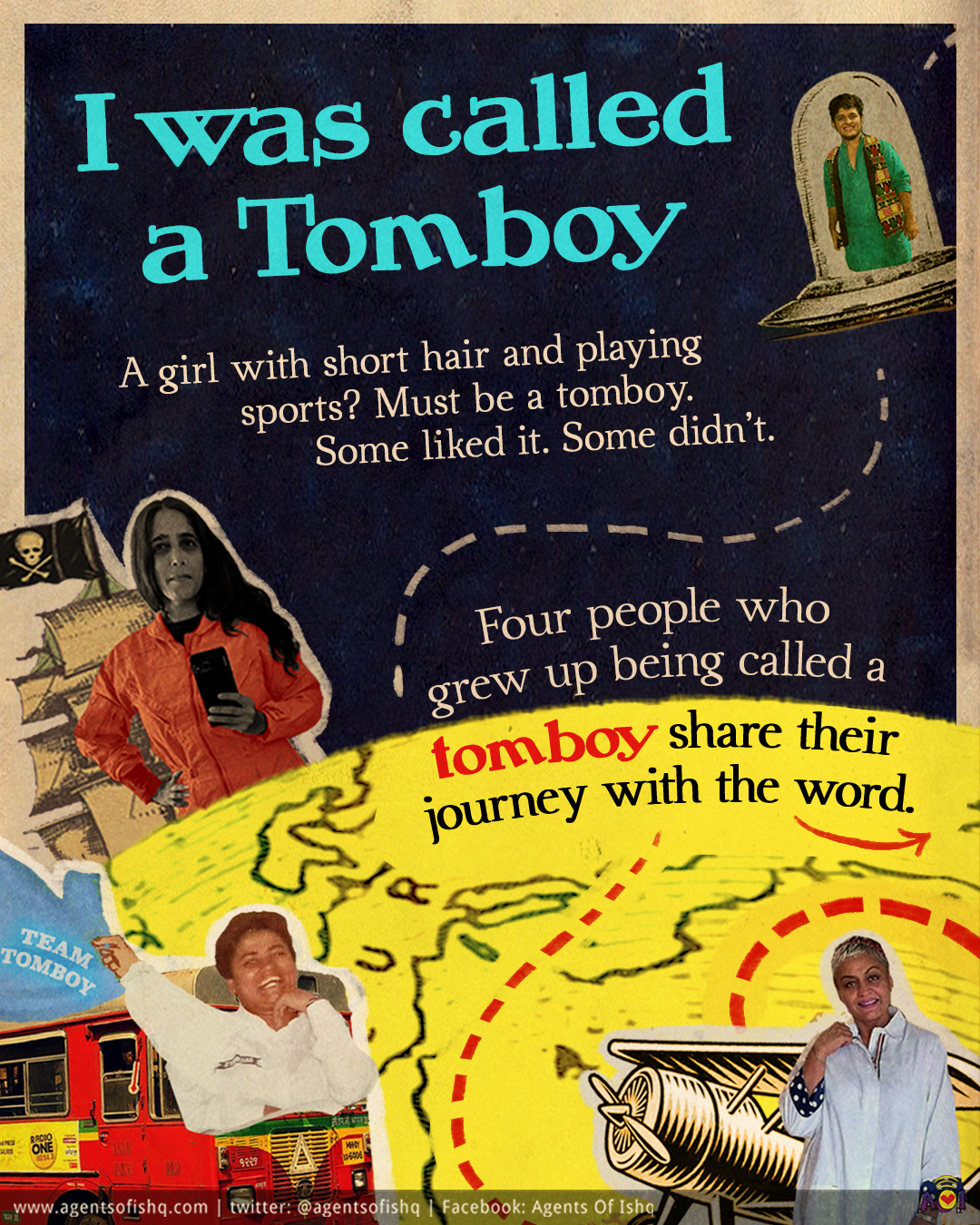
I was called a tomboy
A girl with short hair and playing sports? Must be a tomboy. Some liked it. Some didn’t. Four people who grew up being called a tomboy share their journey with the word.
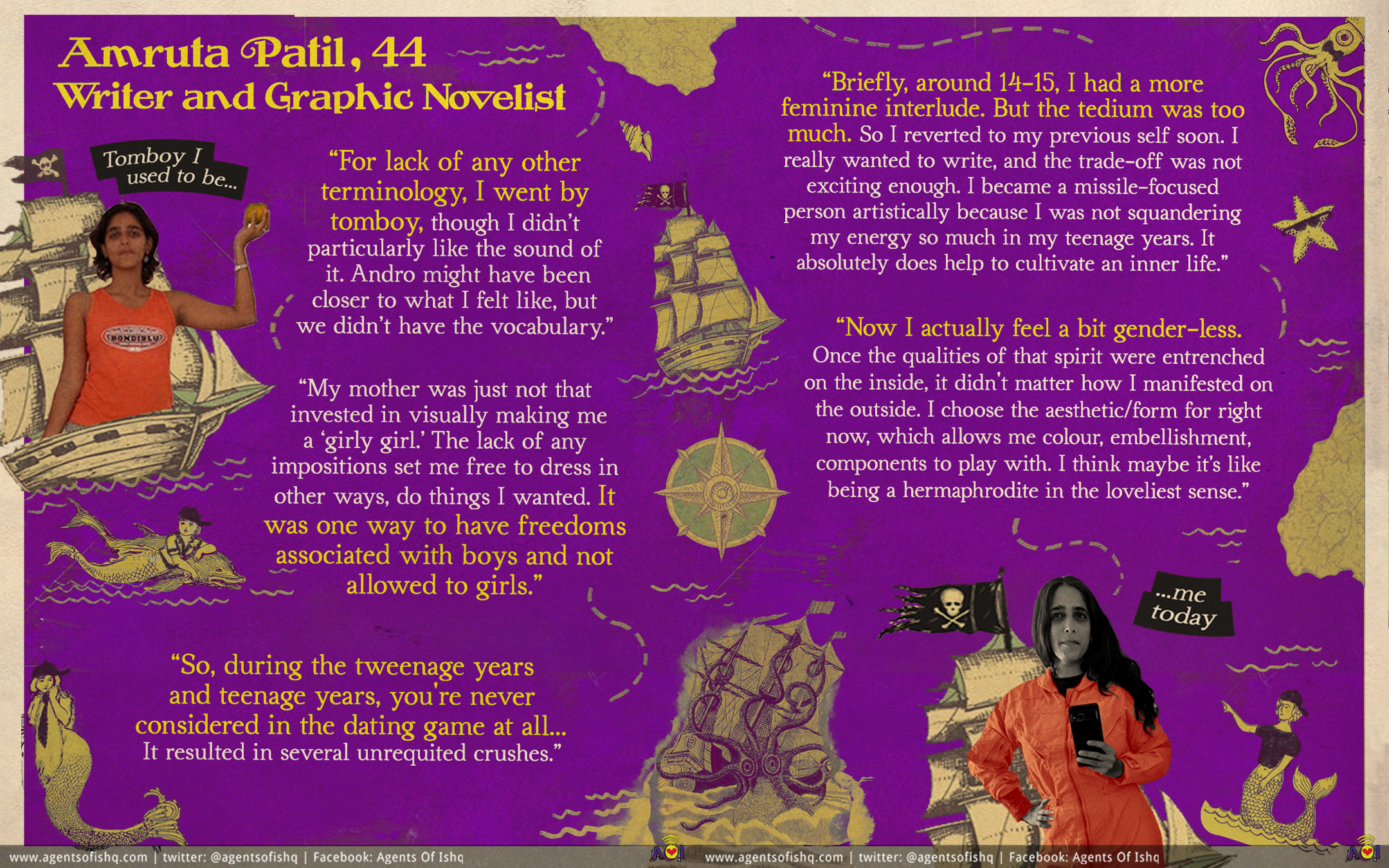
Amruta Patil , 44
Writer and Graphic Novelist
– As Told to Paromita Vohra
Growing up, is “tomboy” a label that you identified for yourself? Or was it something that other people called you?
For lack of any other terminology, I went in the direction of calling myself a tomboy, even though I didn’t particularly like the sound of it. We didn’t have words like andro(gynous), butch etc. until later. Andro might have been closer to what I felt like.
In retrospect, it was just one way one could have the freedoms that were associated with boys and not allowed to girls – I realised this when I began interacting more with girls from Afghanistan and Iran, where we had a certain shared generational experience.
It comes to a closure when you start menstruating. But till that point, you get the chance to play in a much more ‘out of control’ way than you were allowed as a ‘girly little girl’.
So I wonder if it had more to do with actually demanding a certain freedom of movement and activity than anything else.
Do you think being this way inaugurated a different life journey for you?
It did. I’m beginning to realise now that my parents were progressive, even though they didn’t intend on raising me as a gender neutral child.
But my mother was just not that invested in visually making me a ‘girly girl.’ The lack of any impositions set me free to dress in other ways and to do things I wanted. They’re appalling now when you look at the photographic record – bicycling shorts, bum bags and four-sizes too large FIFA T-shirts. But essentially, I was never reprimanded for any of those choices.
However, when you usurp these freedoms, others also see you as being one of the boys, which has its setbacks. During the tweenage years and teenage years, the problem is that you’re never considered in the dating game at all – which was my experience because I’d done such a convincing job of assuming that role.
It resulted in several unrequited crushes. Even though I didn’t always see myself like that, I was received like that by others until I was older.
Briefly, around the age of 14-15, I had a more feminine interlude. But I think the tedium of that was too much. So I reverted to being like my previous self, at around 17/18. I was short-haired till I was about 22.
Did you feel like adopting more feminine ways when you experienced unrequited emotions? Also, that you were not seen as a person in the dating pool could be for diverse reasons. But could it also be the unsaid reason that actually – you enter that path for the possibility of fulfilling whichever capacity you wish – and then that itself becomes such a romantic part of life.
Absolutely. I think I became such a missile-focused person because I was not squandering my energy so much in my teenage years. I really wanted to write, and the trade-off was not exciting enough.
My brother has always been shockingly beautiful. The message that I always got from everybody was, “You're interesting, and he is really handsome.”
But that made me more self-confident about how awesome I was. These semi-shade comparison comments actually helped bolster the inner feeling that "Yes, I actually am quite interesting, compared to the other people in that limited pool I was part of.’ And yes, it absolutely does help to cultivate an inner life.
I had an opposite journey of not being considered woman or girl-like, not because I was a tomboy, but because I was too nerdy, bossy, opinionated, I wanted to ‘be present.’ I wanted to be taken seriously.
Yes, there was some of that going on too. Even my physical development began very late, so I was kind of a bust-less boyish entity till I was about 19-20. So, that was a natural ally in some sort of physical presentation. But also, I was very smart in class, very opinionated - so there were all of these things.
You said you wanted to align the masculine/feminine inside you. What was that journey about?
I think it has components that are emotional, there are others that are visual. Internally, I think it was just asserting, ‘owning it,’ not caring what other people think. Coming into my own professionally also helped reconcile a lot of these things. I had always been things on my own terms, but now I could do that even more so.
I actually feel a bit gender-less in many ways. I don’t know how exactly to put it, but now I just play with it, whatever works with the form, with this particular body at this time. I’m not overly invested in how it’s turning up.
If there is a map of a journey of engagement with genders, where you kind of started off as a tomboy, where do you think you were in the middle, and where would you say you are now?
My body is changing, so there’s that partially. Initially, I was reading different kinds of things–I wanted to be like George from Famous Five, Jo from Little Women. For starters, they are the most interesting people in the story. So partially, it was a desire to ally with those ‘spirit animals.’ Once the qualities that marked those spirit animals were entrenched on the inside, it didn't matter how I manifested on the outside. Now the manifestation is more aligned with what aesthetic/form I want at the age that I am right now.
It allows me more colour and embellishments, many components to play with. I’m questioning my choice of words—maybe more than being genderless, it’s like being a hermaphrodite in a lovely way—both those things have come together more confidently.
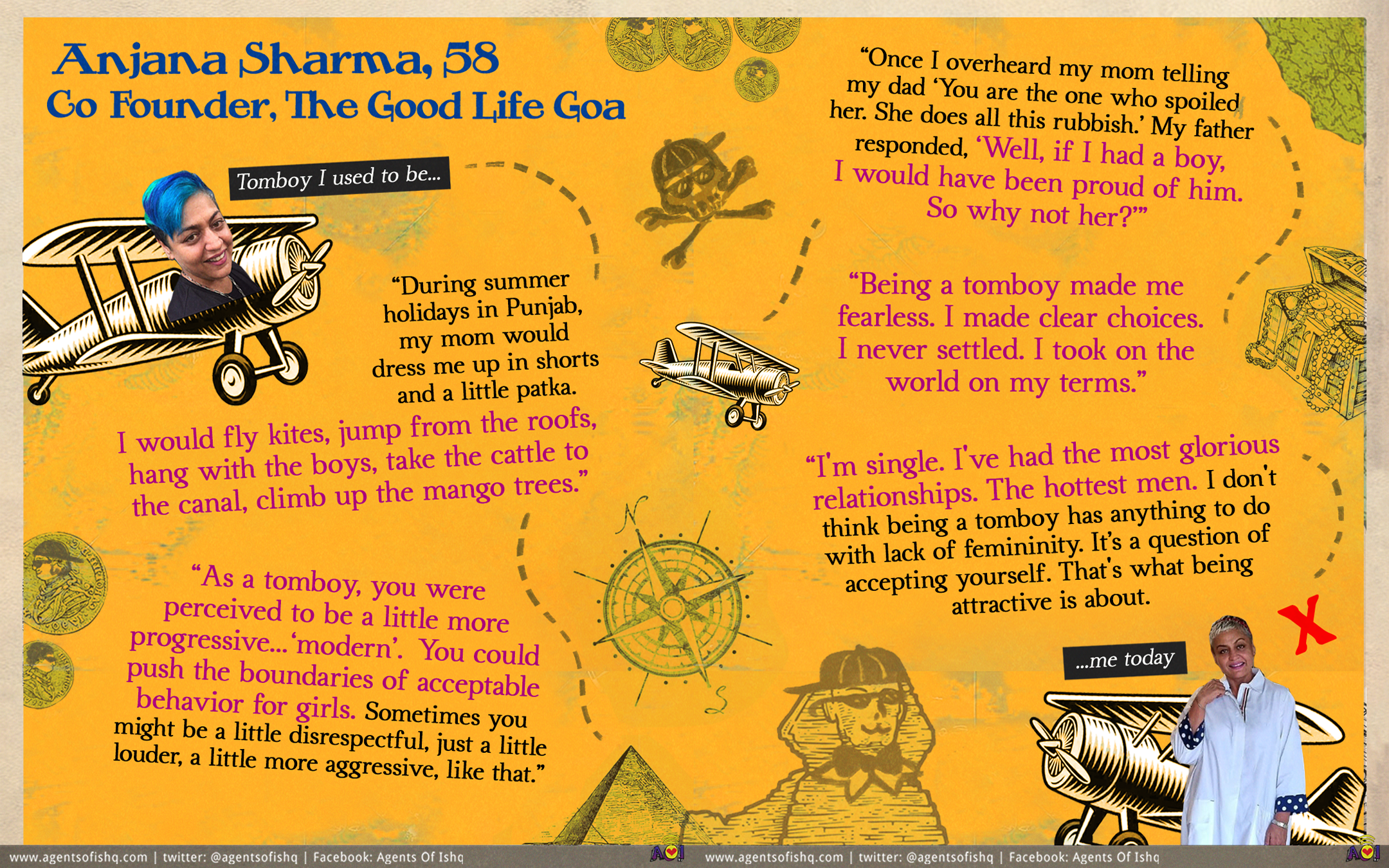
Anjana Sharma, 58
Co-Founder, The Good Life Goa
Interviewed by Vijayalakshmi
Growing up, is “tomboy” a label that you identified for yourself? Or was it something that other people called you?
It started with somebody addressing me as a tomboy and then me quickly accepting it. My mom would dress me up in shorts and a little patka. So nobody ever said anything because they just thought I was one of the little boys.
It just became seamless from there. At no point of time did I identify as being a boy. But I just used it to my advantage to get away with things that I wanted to do.
Was there something that you uniquely understood about being a tomboy?
I found that you were perceived to be a little more progressive. You were allowed to push the boundaries of what was acceptable behavior of a girl. Sometimes you could have been disrespectful, just a little more loud and a little more aggressive etc.
I was a very sporty person. My hobbies were swimming, playing cricket, playing football, and kick the can. As a tomboy, you're allowed to physically exert yourself also.
What was your style? What was your signature kind of clothing at that point of time?
You didn't have many choices. You wore hand-me-downs, which was fine. But if I had my way, even my skirts were divided skirts. Otherwise, you had to wear bloomers. So my mom would make me bloomers for everything.
So it was nice to have a supportive parent that way?
Oh, completely. My father was very strict, and conservative, but never discriminated between me and a boy. He had two daughters. He was extremely proud and he pushed us to do whatever we wanted.
I remember coming home really scared one day because I had really gotten expelled from school. And I overheard my parents having a conversation. My mother was saying, “you are the one who spoiled her. She does all this rubbish.” And my father turned around and said, “Well, if I had a boy, I would have been proud of him. So why not her?”
How would you say that being a tomboy shaped the rest of your life? Is there a connection between that and who you are today?
It made me fearless. I'm single. I never settled. I've lived alone practically all my adult life. I have an older sister who's utterly and gorgeously feminine. She was a Miss India. People compared me to her all the time. But I just think I had very thick skin at a very young age.
I'm not a conventional dresser.
I have my own style. I'm recognized for it. It's part of my business now. So I think that it allowed me to shape my own individual expression. I hate being part of buckets. I want to be myself.
What is your style now?
It's very feminine. I don't dress like a man. But for example, over the period of my life, I've shaved my hair three times. And the strength to do that also comes from the fact that you don't identify with the conventional norms of beauty.
The best and the hottest men hit on me when I was bald. I've had the most glorious relationships. I've had the hottest men. I don't think being a tomboy has anything to do with a lack of femininity. I think it's a question of accepting yourself. The minute you are comfortable in your own skin, you send out the correct aura and vibrations. And that's what being attractive is about.
Would you say that the word tomboy has relevance today? In this day and age where women can do a lot of things, unlike a lot of things that said girls were not allowed to do when you were a child.
It was another label at that time. If you were a marriageable age and a tomboy, it was a negative, right? It was a bad label. But if you were smart enough to twist it to your advantage, that's great. These are labels that society creates. Now, you have to, as an individual, have enough strength of character to understand what is negative and what is not.
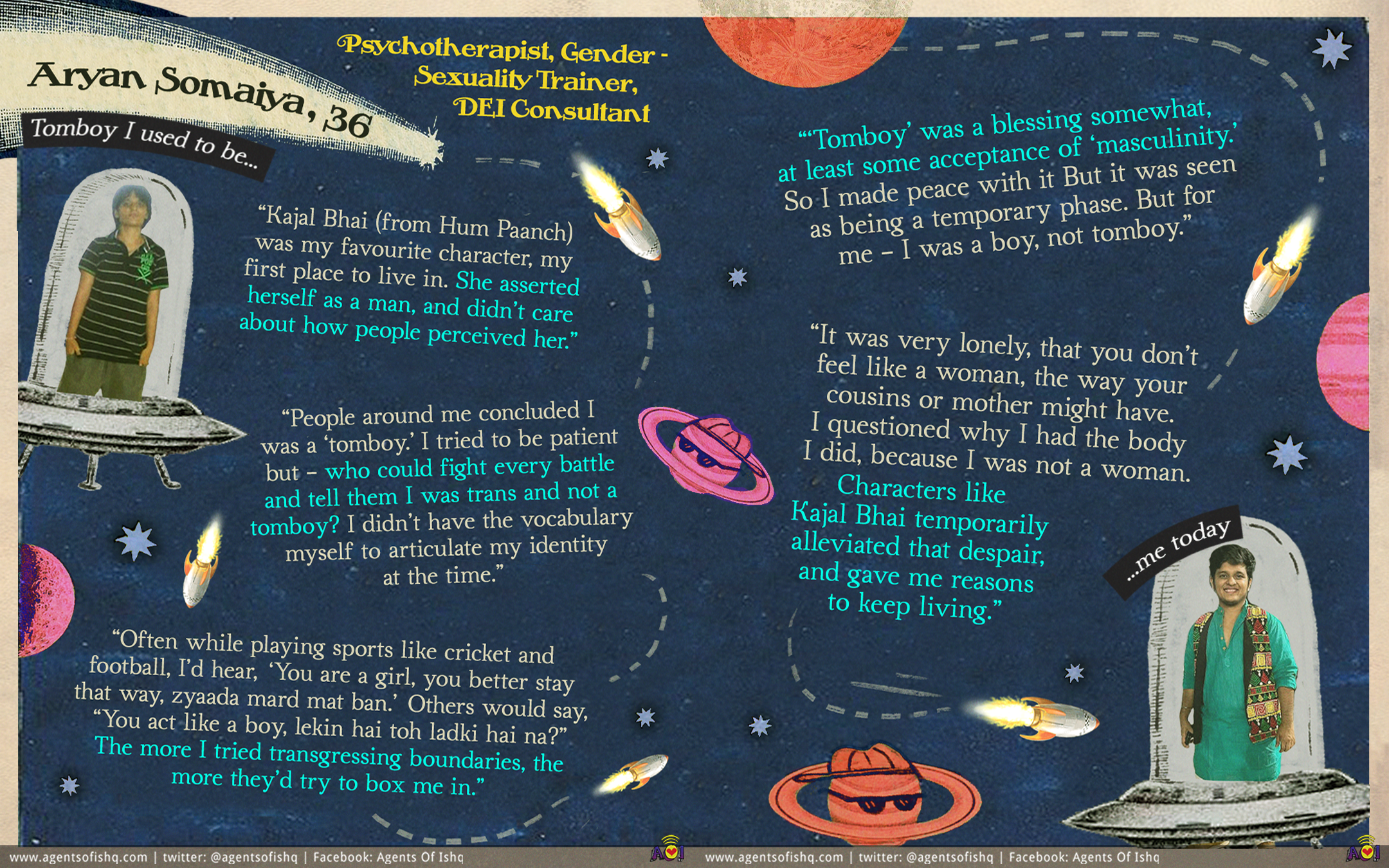
Aryan Somaiya, 36
Psychotherapist, Gender and Sexuality Trainer and DEI Consultant
Interviewed by Harshita Kale
Growing up, is “tomboy” a label that you identified for yourself? Or was it something that other people called you?
The word ‘tomboy’ was always about how others perceived me – I never identified as one. Any woman who ‘acted like a man’ growing up in the ‘80s and ‘90s was either a Kajal Bhai from the TV show Hum Paanch or a Falguni Pathak, the iconic Garba Queen. Kajal Bhai was my favourite character, my first place to live in.
Could you give me a little glimpse of your relationship with Kajal Bhai?
Kajal Bhai was the only person who asserted ‘I am a man’. Everybody thought that ‘she was just a tomboy.’ I think it was much more than that, that she was queer, at the very least, even though they weren’t explicit about it.
She was portrayed as somewhat unworthy of love because she was ‘like a man.’ The guy says, ‘Tum toh ladke jaise ho, tumse kaun pyaar karega?’ (You are like a man, who will love you?)
But then, she didn’t give a damn about how people perceived her. And that is something I loved and looked up to.
Did you have a certain vibe that other people recognized in the character of Kajal Bhai as well?
I always wore boy’s/men’s clothing, and had short hair. I was also extremely athletic. I had long hair till about Class 4 or Class 5, when it was compulsory to wear plaits to school. But as soon as I came home, I tucked my hair into a cap, just like Kajal Bhai. I also always had male friends.
People believed that I was a tomboy, that it was a phase that would go away. But it definitely wasn’t. I think people were also more accepting of the word tomboy than calling it any other name.
Yes, it was less scary than perhaps being something ‘more.’
Yeah, it was less scary and also more acceptable – that there is hope that it will go away eventually.
And then when I got older, when I was about 15-18 years old, they started calling me Falguni Pathak.
How did you react to people calling you a tomboy? And did being boxed into that label counter-intuitively strengthen your self-image/identification as a boy instead?
People around me perceived visual markers, such as the way I dressed, my speech mannerisms and my gait, and immediately concluded that I was a ‘tomboy.’ Usually, I tried to be patient with them – who could fight every battle and tell them that I identify as a boy, that I was trans? In fact, I didn’t have the vocabulary myself to articulate my identity at the time – I only started understanding myself better in my early 20s.
The word tomboy was somewhat of a blessing for me – there was at least some acceptance, some visibility of ‘masculinity.’ I made my peace with the word a little because of this.
While there was some acceptance, did you face any backlash for not being ‘womanly’? If pop culture figures like Kajal Bhai and Falguni Pathak didn't exist, do you think reactions would have been a little different?
I cannot recount the many times that that has happened - and which happens even now. There was pushback even from the boys I was friends with. Often while playing sports like cricket and football, they would say, “You are a girl, you better stay that way, zyaada mard mat ban.” Others would say, “You act like a boy, lekin hai toh ladki hi na?” The more I tried transgressing boundaries, the more they would try to box me in.
A lot of people came up to my mother and told her ‘Make her wear girls’ clothes.’
Since other people who resembled me existed in mainstream spaces, the word ‘tomboy’ felt very safe in some ways– at least there was an identity where people couldn’t force me to change.
I am so glad that Kajal Bhai existed. ‘Tomboy’ was a very good exit point for me from fights and from discussions about why I was a certain way. People did say that, and still do - but then somebody would come along and say - ‘Are, she is a tomboy, like Falguni and Kajal Bhai.’
But there was still the connotation that it’s ‘curable’ – after marriage, it will be the husband’s problem - and automatically, ‘it’ll get better/okay’. And then the other lines of thought - ‘we’ll find an effeminate man for her!’ If she is a boy-like girl, then we’ll find a girl-like boy for marriage.
The fact that it was perceived as being a temporary phase was also why it was allowed, rather than accepted.
Did you find other tomboys growing up? Did you ever feel lonely?
I had this one person in school who is now also trans. We knew internally, ‘ki hum ‘vohi’ hai (trans)’. The only solace was having that person.
But finding others like me was very rare. I think this was the only person I met. Since I was in a girls’ school, there were a lot of stereotypically ‘masculine’ girls who were sporty, but also became conventionally feminine by the time they came to the 9th or 10th grade.
It was very lonely, that you don’t feel like a woman, the way your cousins or mother might have. I did question why I had the body I had, because I was not a woman. But characters like Kajal Bhai temporarily alleviated that despair, and gave me reasons to keep living.
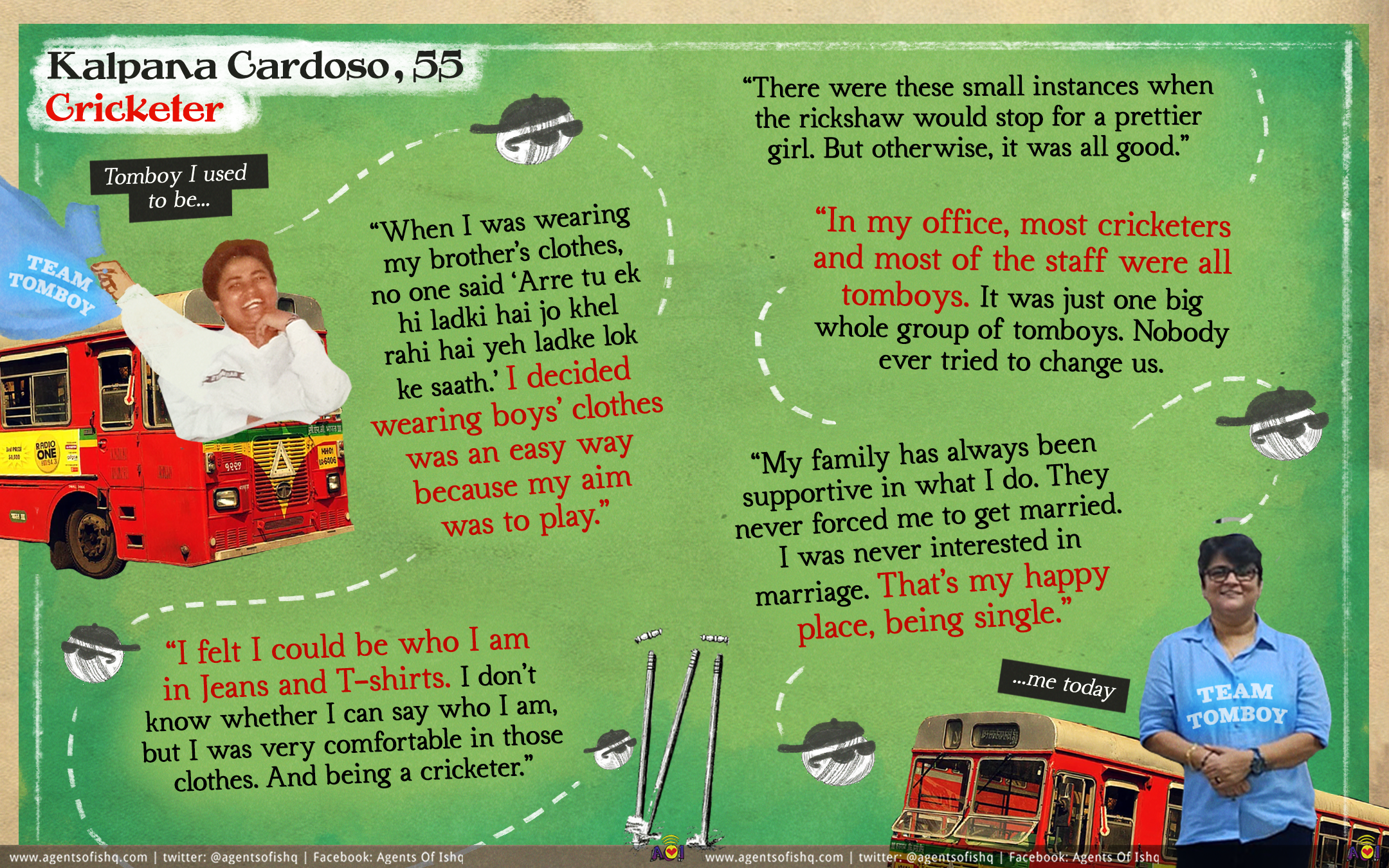
Kalpana Cardoso, 55
Cricketer (Selector, Women’s Senior Cricket Team, MCA)
Interviewed by Vijayalakshmi
Did you call yourself a tomboy when you were younger or is that something that others called you?
It was definitely what other people called me because when we were that young, we did not know the meaning of tomboy.
When I used to wear my brother’s clothes and go to play, I used to think, “Oh, my God, it's so much easier.” I didn't find people saying, “Are tu ek hi ladki hai jo khel rahi hai yeh ladke lok ke saath.” So I decided, “Oh, this is an easy way” because my aim was to play; no matter what I wanted to play.
Was there something that you uniquely understood about being a tomboy?
For me, it was the easiest way to get into sports. I was interested in cricket. So I could play cricket with the boys team only if I wore shorts and a t-shirt.
When I used to travel by train, to go for cricket practice, I had to travel by train in the ladies compartment, right? Whenever we used to enter the train with those big bags and our cricketing gear, they used to always say, “Nahi, nahi, ye ladies hai. Gents mein jao.”
There were a couple of times we got into these kinds of fights on the train.
What was your style? What was your signature kind of clothing at that point of time?
When we joined professional cricket, we had to wear pants and t-shirts. To pack jeans and a t-shirt was easier than to pack a dress and then shoes according to the dress etc. It became easier to just throw on jeans and a t-shirt and you can wear those sports shoes the whole day.
I had long hair till the 10th standard, but it became easier to cut your hair.
Every time I was forced to wear a dress, for family occasions or weddings, I felt very uncomfortable.
I felt like I could be who I am in those clothes (jeans and t-shirts). I don't know whether I can say who I am, but I was very comfortable in those clothes.
How would you say that being a tomboy shaped the rest of your life? Is there a connection between that and who you are today?
I felt throughout my life that I was comfortable to do everything and anything without people actually pinpointing that, oh, this is a girl doing something like that, you know?
If there was anything I would say I'm happier. There were these small instances when the rickshaw would stop for a prettier girl. Or if a prettier girl would be granted a request, but we’d be sent back.
These were the only few instances, where we were treated differently. But otherwise, it was all good. And I never felt that problem. I always felt that whatever I had, I could make the best out of it.
I joined my job at the age of 18. In my Western Railway office also, most of our cricketers and most of our sports staff were all tomboys. We did not know anything different actually. We had a very good rapport. Nobody ever tried to change us.
What has the personal side of your life been like?
My full family has always been supportive in what I do. They never forced me to get married.
I knew that right from the beginning. The thing of leaving my home, my comfortable space and going to somebody else's house, just totally put me off. I was always comfortable on my own. And so I was never, ever interested in marriage. I mean, that's my happy place, being single.
Would you say that the word tomboy has relevance today? In this day and age where women can do a lot of things, unlike a lot of things that said girls were not allowed to do when you were a child.
I don't think so now. I don't think that girls want to grow up in that mold or they want to be branded as tomboy. In those days, we did not feel shy to be a tomboy. Now the girls feel like if they are more feminine, it is better because you're getting equal opportunities. And with so much peer pressure, they don't want to be different.








